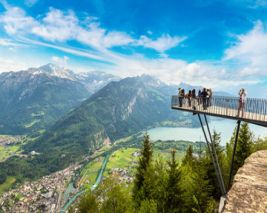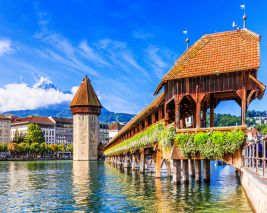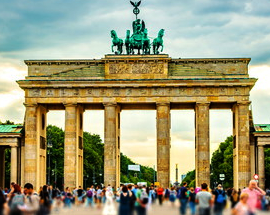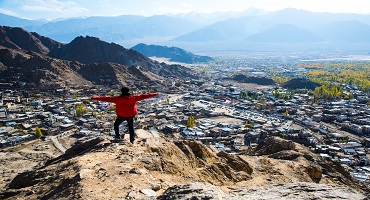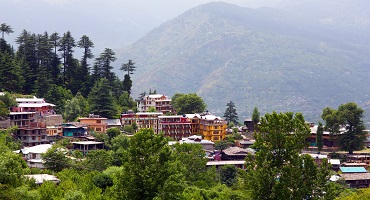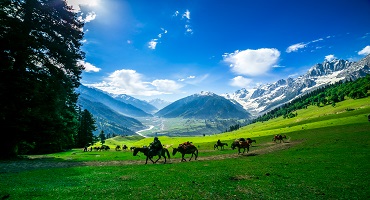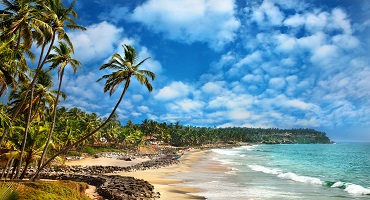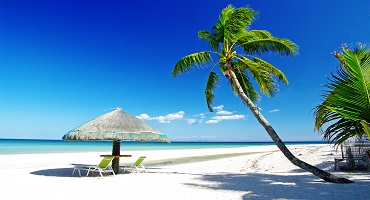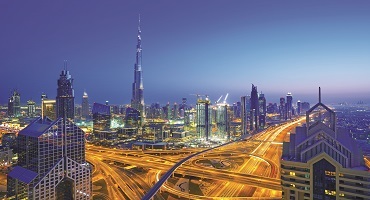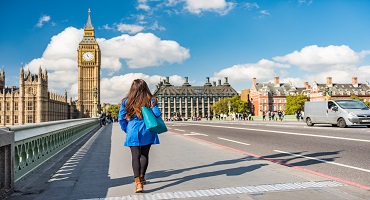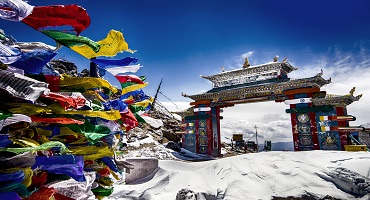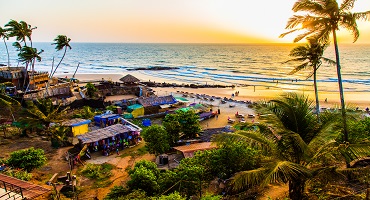Best time to Visit Germany
As a holiday destination Germany will spoil you for choice and give you a memorable holiday. With an interesting mix of culture, history and the outdoors, your German holiday will be one full of adventure and excitement. While the Bavarian and Black Forests promise the thrill of mystery, Germany’s cities present you a mosaic of varied experiences. Art galleries and performance theatre give you a glimpse of the local culture and the museums present neatly chronicled history for history buffs.
The gardens and parks in the cities are little slices of nature where the locals come for a moment of peace from the mad rush. Germany also hosts various festivals throughout the year. So, depending upon the time of your holiday, you can catch at least a couple of them. There is no bad time to visit Germany, except for maybe the winter. Here’s a close look at Germany’s weather around the year to help you decide your best time to visit.
Peak Season : Summer (June to September) is the peak tourist season in Germany. The warm weather is great for outdoor activities such as hiking and swimming. The long sunny days ensure that you make the most of your time outdoors.
Shoulder Season : Germany’s shoulder seasons are spring (March to May) and autumn (October to November). Spring is an unpredictable season which sees sunshine, rain, hail and even snow. Autumn is more consistent and experiences better weather than spring, except in November, which is colder.
Low Season : Winter (December to February) in Germany is a cold affair and temperatures often stray below freezing. The days grow shorter as the sun sets at around 4:00 pm. This is the quietest time in Germany.
| Season |
Temperature |
Weather |
| Spring |
0 to 19°C |
Cold, with rain and snow |
| Summer |
10 to 24°C |
Pleasant, with rainfall |
| Autumn |
1 to 19°C |
Cold, with rainfall |
| Winter |
-5 to 5°C |
Cold, with heavy snowfall |
Germany in Spring (March to May)
Temperature - The spring temperatures in Germany vary between 0 to 19°C depending on which part of the country you’re in with north being the coldest.
Weather - Spring brings a very volatile weather that can alternate between sunshine, rain, hail and snow, sometimes all in a single day. May tends to be more pleasant than either March or April.
Significance - Spring brings the first rays of sunshine after a cold, hard winter. Though the chill remains well into April, people start venturing outdoors gradually. The rains make an irregular appearance and the weather warms significantly towards the end of the season.
Why you should visit now - The cherry blossoms that make their appearance along with spring, blanket the parks and the cities with a plush pink carpet. Germany celebrates many of its festivals during this season. The Stuttgart Spring Festival is one big carnival with plenty of food, rides and beer tents. The Carnival of Cultures in Berlin celebrates the city’s multi-cultural spirit with exotic food, drinks, dancing, performances and parties. Spring sure is a good time to be in Germany.
Things to know before the visit - March and April are the coldest months of spring and may not be ideal for everyone. Plan your holiday in the latter part of the season to be able to get some sightseeing done. You can enjoy significant discounts on your travel and accommodation.
Tips - Carry your woollens as well as good rain gear on your spring holiday. Since the weather can change in an instant, it is advisable to layer up. Avoid long queues at tourist attractions by booking your tickets online.
Germany in Summer (June to September)
Temperature - The summer temperatures in Germany range between 10 to 24°C around various parts of the country. Although it is not uncommon for the temperatures to touch 37°C on certain days.
Weather - Summer weather in Germany is marked by long sunny days and a good amount of rain. The southern parts of Germany are warmer than the northern cities.
Significance - This is the busiest season in Germany and the best one to enjoy all the delights that it has to offer. Hiking, trekking and mountain climbing are the favourite outdoor activities. This is also the time when Germany is the most crowded as locals enjoy their annual holidays.
Why you should visit now - The entire country comes alive in summer. The locals join the tourists in the merriment as schools break for the summer holidays. The four-day Fusion Festival in Neustrelitz is a seamless fusion of electronic music with art, theatre and films. The Rhine in Flames Festival will leave you bedazzled with a brilliant display of fireworks that is complemented by the soft glow of brilliantly lit-up steam boats gliding across the river. Apart from these festivals, summer is also the time for outdoor activities among the mountains and at the beach.
Things to know before the visit - You will face long queues and crowds at most tourist attractions around the country. You will have to pay more for your travel and accommodation during this season and you must book your hotel well in advance.
Tips - Pack for warm weather with light summer clothes and a light jacket to protect against an unseasonal drop in temperature. Take your swimsuit along and always keep an umbrella handy along with a water bottle. Also carry a trash bag whenever you’re out and about as Germany has very strict anti-littering laws.
Germany in Autumn (October to November)
Temperature - The mercury dips significantly during autumn and temperatures around the country average between 1 to 19°C.
Weather - Germany revels in the last warm days of the year during autumn, which the locals call Indian Summer, before winter sets in. The weather starts turning cold and rainy even as the days start shortening noticeably. November even sees the first flurries of snow.
Significance - As the summer tourists begin leaving, a calm descends over the country. But October heralds Oktoberfest which again brings a surge of thirsty travellers into the country. After October, the travel and hotel rates start falling in direct proportion to the weather and allow you to enjoy appreciable discounts on your holidays.
Why you should visit now - Oktoberfest is perhaps the biggest reason to visit Germany in autumn. It sees the locals venture out in their best lederhosen to indulge in Herculean feats of beer-drinking accompanied by hearty local fare. Germany does not celebrate Halloween, but has a festival dedicated to pumpkins. The Ludwigsburg Pumpkin Festival has themed pumpkin displays, pumpkin boat races and even a European Pumpkin Championship for the heaviest pumpkins. Autumn in Germany is truly a season to indulge in unusual festivals.
Things to know before the visit - Oktoberfest is the biggest festival of autumn. Even though autumn does not see many tourists, the hotel and travel prices go up for the duration of the festival. Be sure to take this into account while planning your holiday.
Tips - If you find Oktoberfest too crowded, you can head to any of the other cities which have their own version of the festival.
Germany in Winter (December to February)
Temperature - With temperatures ranging between -5 and 5°C, winters in Germany are not for the faint hearted. Temperatures have been known to dip as low as -20°C!
Weather - Winter weather in Germany is a combination of subzero temperatures and heavy snowfall. January is the coldest month of the year and receives the most snow during the year.
Significance - The Bavarian Alps offer some of the best skiing in Europe. But the real excitement is to be found in the cities where Christmas Markets add cheer to the cold gloom of the harsh winter.
Why you should visit now - Along with the Christmas Markets, the other highlights of winter in Germany are the Berlin Fashion Week and Berlinale or the Berlin International Film Festival. Both these events attract the big names and some of the greatest talent from the respective industries. They are counted among the most important events in Germany’s social calendar.
Things to know before the visit - You can buy movie tickets for the Berlinale at least 3 to 4 days in advance. You’ll get excellent meals at the Christmas markets which cost significantly less than restaurants.
Tips - Pack your heaviest woollens and layer up against the cold. A thermal suit will be helpful against the biting cold and good grippy shoes will save you from nasty falls.
Germany is fascinating in any season. If you’ve already chosen your best time to visit, book your holidays online. But, if you’re looking for something more special, visit your nearest Thomas Cook branch to craft your dream holiday.







